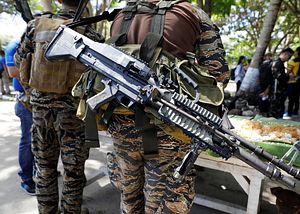In March 2017, Philippine President Rodrigo Duterte approved the National Security Policy (NSP) for 2017-2022. Similar to the previous NSP, the document viewed national security as a broad concept — not limited to the protection of territorial integrity and sovereignty, but also inclusive of other aspects such as “cultural cohesiveness” and “moral and spiritual consensus.” Reflective of the current government’s thrust, the new NSP places a particular focus on combating illegal drugs and criminality.
But beyond domestic security challenges, including internal armed conflicts, how does the new NSP perceive the strategic environment of the Asia-Pacific region? And how does it seek to address external security challenges?
Describing the United States as “the only superpower in the world,” the NSP views Washington’s security presence in the Asia-Pacific as a “stabilizing force.” The NSP also noted that the “rise of China” has generated “concerns not only among developed countries such as the U.S., Japan, and South Korea, but also among the ASEAN nations” because of Beijing’s economic clout, as well as its “territorial claims in the WPS [West Philippine Sea, or the South China Sea].” The NSP points out as well that the rising tensions in the East China Sea have provided “a strong incentive for Japan to upgrade its defensive capabilities.” As such, the NSP emphasized the importance of “ASEAN centrality… to manage the impacts of geopolitical rivalries among the great powers.”
Against the backdrop of this strategic environment — and despite the president’s recent overtures to China — the NSP emphasized: “The dispute over the West Philippine Sea (WPS) remains to be [sic] the foremost security challenge to the Philippines’s sovereignty and territorial integrity.” Viewing the dispute as a threat not just to the Philippines, the NSP underscored that the WPS issue also affects “regional peace and stability.”
In this regard, the NSP identified three major policies for addressing Manila’s external security challenges. First, develop defense capability through the Armed Forces of the Philippines modernization program (AFPMP) as well as harnessing the Philippines’ security arrangements with other countries. Aside from reassuring the public that the AFPMP would continue, the Duterte administration emphasized the importance of its security agreements with other countries. Noting that Washington “remains as the sole defense treaty ally” of Manila, the NSP also emphasized the importance of the Philippines-Japan “strengthened strategic partnership.”
Second, Manila will support efforts in promoting the rule of law in the WPS and respect the verdict of the Philippines v China arbitration case. Taking note of the Philippine victory in the landmark 2016 ruling, the NSP underscored that Manila “will tread with prudence on this complex and delicate issue and will carefully calibrate its diplomatic moves to avert the costly consequences of any potential outbreak of armed confrontations in the disputed sea region.” At the same time, it called for the implementation of the Declaration of Conduct (DOC) and supports the negotiation of the Code of Conduct (COC) in the South China Sea. Moreover, the NSP highlighted the need to engage “claimant-states on the way forward for the management and settlement of disputes.”
Third, the Philippines will pursue maritime boundary delimitation with “adjoining states,” and the passage of laws on archipelagic sea lanes and maritime zones.
Clearly, the NSP sees a complicated Asia-Pacific security environment, underpinned by shifts in the regional power balance with geopolitical flashpoints, like the South China Sea/WPS, as a manifestation of such systemic changes. States will define their national interests in this strategic context. For small powers like the Philippines, this means walking precariously on a tightrope where Manila will have to execute measures designed to protect its territorial integrity while sustaining relatively good relations with countries in the region to avoid escalating tensions, and complementing efforts in promoting an environment conducive for commerce and trade. In other words, the current geopolitical landscape calls for a pragmatic policy or, as the NSP puts it, the need to “tread with prudence” in handling security issues.
Interestingly, the NSP outlined and/or reaffirmed other initiatives which, although applicable to internal security concerns, may have a long-term effect on Manila’s external security policy. These include: the promotion and enhancement of “unified coordination among the members of the security community,” which aims to ensure coherence in policymaking and implementation; the promotion of a strategic communication plan, which seeks to ensure that the government speaks with clarity and with one voice, and which may also prevent nationalist rhetoric from getting out of hand; and the formal incorporation of the national crisis management system in the NSP, which intends to prevent situations, like the 2012 Scarborough Shoal incident, from exploding into a major international crisis.
I have argued elsewhere that, thus far, Duterte appears to be pursuing hedging in his foreign and security policy, the aim of which is “avoiding the danger of putting all-the-eggs-in-one-basket while keeping a fallback position.” Such an approach, however, demands strategic foresight and tenacity in order to have flexibility in an unpredictable security environment.
Mico A. Galang is a researcher at the National Defense College of the Philippines (NDCP). The views expressed are the author’s alone and do not necessarily reflect the official position of NDCP.

































